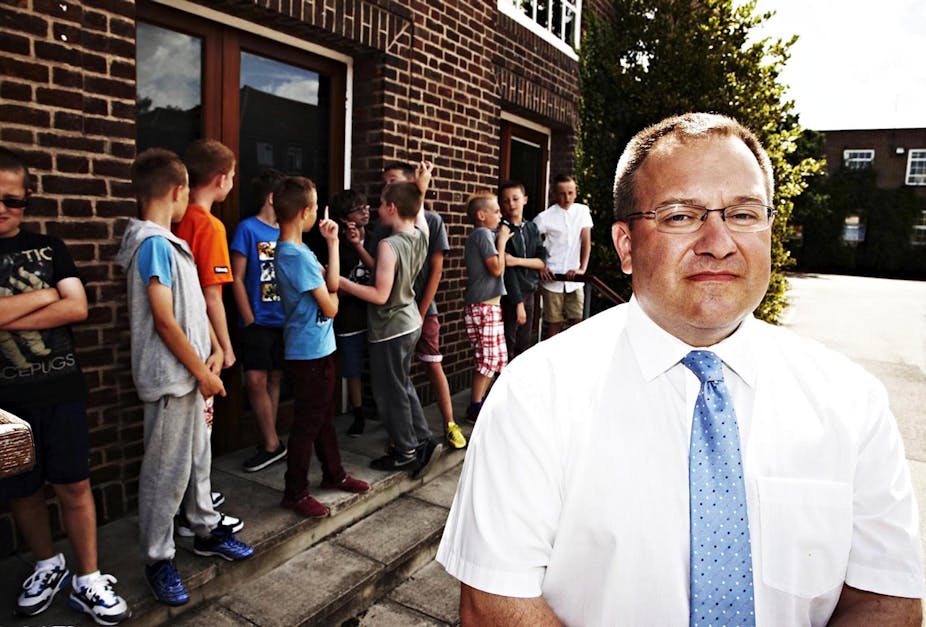Mr Drew’s School for Boys, currently showing on Channel Four, illustrates in graphic detail the kinds of behaviour that causes trouble in school. Eleven boys under the age of 12 who have either been excluded or are at risk of being so, were enrolled in a four-week residential summer school with their parents. Four teachers, a child psychologist and a headteacher – Mr Drew, first seen in the 2011 series Educating Essex – attempt to reform the boys and support their parents to be more consistent in their approach.
It’s worth looking at the figures on school exclusion to put the boys in the series in context. In England, 5,170 young people were permanently excluded from school in 2011-2012 and a further 162,400 received one or more fixed term exclusions. The number of students being permanently excluded has been steadily declining over the last decade, but this is still a worrying number of young people whose life chances will be lessened because of their inability to get on with and progress through their school. “Persistent disruption” can have serious consequences.
The majority of excluded pupils are working class boys who struggle with school and with school-work. They can often be found yelling out, walking out and generally acting out in ways that most schools aren’t prepared – or able – to put up with. So they are removed for a short period of time, or if they don’t change their behaviour, removed from the school for good.
No miracle cure
In Mr Drew’s school, the day follows a relatively conventional pattern. Students attend lessons in English, Maths, Science and PE. They go on excursions and play team sports. They eat school dinner together.
However, this is where the similarity to an ordinary school ends. Classes are small, and always have two adults in attendance, with others not far away if it all “kicks off”. All the staff, like Mr Drew himself, are supremely patient, balancing humour and positive regard for the boys and their parents with reason and a firm commitment to a basic set of behavioural rules. They are everything you might expect extremely good teachers to be.
Mr Drew is clear that this is no miracle cure. The residential experience is unlikely to result in a Hollywood-style salvation, where naughty boys come to stay, are transformed and then never get in trouble again. It is, Mr Drew suggests, a chance for the boys to have a positive educational experience and to develop some new responses to situations they previously found impossible. Their parents may also practice some new coping strategies.
But Mr Drew’s School for Boys is a pretty expensive intervention. A month of six professional salaries, plus boarding costs for the boys and their parents, doesn’t come cheap.
From September 2014, the pupil premium, an additional sum given to schools to provide additional support for vulnerable pupils is £1,300 for primary pupils, £935 for secondary aged pupils and £1,900 for looked-after children. These sums would come nowhere near the costs involved in Mr Drew’s summer school.
So what does this programme offer, other than providing a glimpse into the lives of some troubled and troubling boys and their parents? It does raise important questions.
First, about whether this is an option that can be extended. There are after all 5,170 permanently excluded young people in England, and potentially many more in the making. Assuming that a residential option does have a positive long-term effect – and we have only very limited evidence about this kind of programme – how can we provide this kind of intensive intervention for others who might benefit?
But this also raises the question of whether there are less expensive interventions that would have the same results. Other early intervention methods include intensive literacy support, behaviour support and work with families. Are there ways in which the problems that Mr Drew’s boys had could be dealt with earlier?
And it points to how schools themselves can provide more support for young people on the edges of education. Do they always have to be sent somewhere else? What kinds of changes might schools have to make to their curriculum, organisation and teaching in order to be more inclusive of young people? There is a growing body of evidence of best practice on what principles works in alternative education.
Mr Drew’s real school, Brentwood County High School is actually taking on this challenge. Mr Drew announced on the school website that they cut exclusions for year 7 to 11 pupils by 60% in 2012-13. They are not the only school to do this, and there may well be wider benefits accrued by looking at these experiences than at the more novel residential approach. But of course this may not be such good television.
As the government comes to the end this July of a three-year trial to give schools responsibility for providing alternative education for children who are excluded, these questions deserve wider debate. Perhaps Mr Drew’s School for Boys will be a catalyst for them to be aired.

